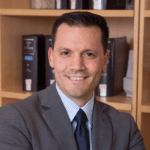Making a Case for Asylum
December 1, 2016 |Rivkin Radler immigration attorney Henry Mascia last week secured asylum for a 17-year-old girl from El Salvador. The gang MS-13 had repeatedly threatened her and her family. The client was referred to Rivkin Radler LLP by Kids in Need of Defense (KIND), a nonprofit organization that partners with attorneys willing to provide pro bono representation to unaccompanied immigrant and refugee children in removal proceedings.
Henry was faced with unique challenges. Although the client and her family received threats, the client herself had not been persecuted. Henry therefore had to prove that she had a well-founded fear of future persecution on a protected ground.
The client’s fear of persecution did not fit squarely into any of the clearly defined grounds for asylum, such as race, religion, nationality or political opinion. Instead, the client feared persecution on account of her membership in a particular social group.
The definition of a particular social group has produced a great deal of litigation, which has sometimes resulted in conflicting decisions. To meet these challenges, Henry used his knowledge of immigration law, developed during his time at immigration court as an attorney for the U.S. Department of Justice, to gather the necessary evidence to establish that the client qualified as a member of a particular social group.
Although varying definitions of “particular social group” exist, Henry gathered evidence to satisfy the most restrictive definition. Rivkin Radler hired a country-conditions expert to explain that the client’s potential persecutors and society at large recognized the client as a member of a particular social group. Using case comparisons, he demonstrated that the particular social group had discrete, definable boundaries. Henry also gathered evidence establishing that she could not be safe anywhere in her country and that her country’s government was unwilling or unable to protect her. With the help of a Spanish-speaking firm employee, Evelyn Arboleda, Henry interviewed and obtained affidavits from more than a dozen friends and family to corroborate the client’s case.
The process took over a year and a half to complete, and Henry spent more than 125 hours on the case, work that was performed pro bono.
Now that the client has obtained asylum status, she is in the process of obtaining her green card. Henry has agreed to represent her pro bono through that process as well. More importantly, she can live safely in the United States without fear of deportation.
Her cousin is still attempting to obtain asylum on the same basis, and his hearing has not been scheduled. Rivkin Radler is representing him as well.



